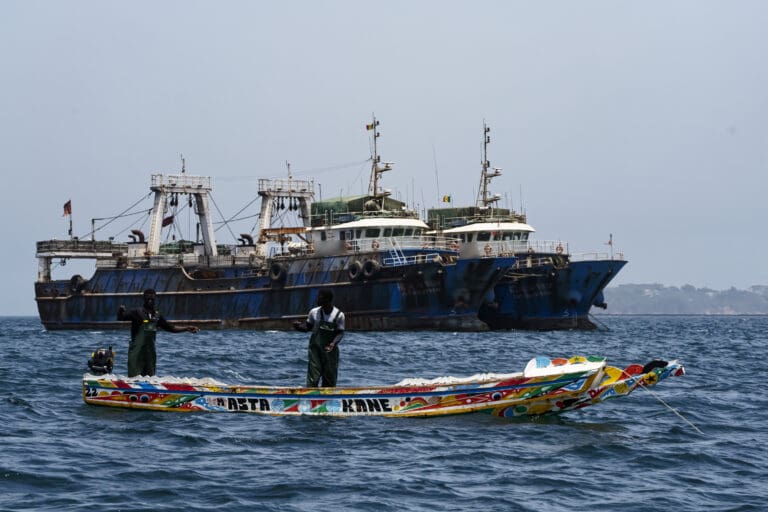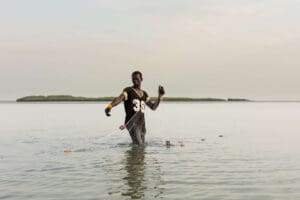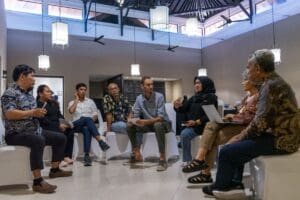In a win for small-scale fishers, fishworkers and their communities, Honorable Emilia Arthur, Minister of Fisheries and Aquaculture, shared Ghana’s commitment at UNOC3 in Nice, where heads of state, policy makers and civil society alike have gathered to chart a course for sustainable ocean management.
The commitment extends Ghana’s current national inshore exclusion zone (IEZ) from six to 12 nautical miles – the entirety of its territorial waters – in a pledge that will protect fragile ecosystems from irreparable harm, respects the stewardship and ways of life of small-scale fishers, and prioritises the economy and food security of the country’s coastal communities.
Speaking at an event hosted by the Transform Bottom Trawling coalition, the minister also committed to the co-management of the exclusion zone, a pledge that was met with cheers from the region’s artisanal fisher representatives present.
Nana Kweigyah is a Transform Bottom Trawling Coalition member representative and National President of the Canoe and Fishing Gear Owners Association of Ghana (CaFGOAG). In response to the commitment he said; “I applaud the Minister’s interest in supporting the development of artisanal fisheries. For years, fishers have raised the issue about industrial vessels coming too close to the shore, so this is a vote of confidence for our role in fisheries management.

“Given this important extension, it is now critical that we look at how this inshore exclusion zone is managed. Declines in fish catch caused by industrial fishing can weaken local communities’ motivation to engage in conservation practices. And so we welcome the commitment to consult on the co-managed of these areas, in order to concurrently address widespread illegalities in the artisanal fisheries sector.”
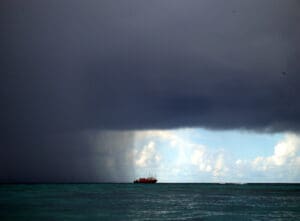
The Transform Bottom Trawling Coalition, convened by Blue Ventures, unites fishing communities across the globe against the most destructive form of industrial fishing. Coalition members and civil society groups – both including small-scale fisher representatives, have campaigned extensively for the establishment and extension of IEZs in territorial seas, and were instrumental in securing the commitment from Ghana’s government.
In a positive step toward transparency, the government of Ghana has also submitted a bill to parliament which requires the beneficial ownership of industrial fishing boats to be checked before licenses are granted.
Ebrima Saidy, CEO of Blue Ventures commented; “These are bold and determined commitments from Ghana’s government.
“As the movement against destructive industrial fishing builds, I hope other nations will now follow suit and take heed of the effective management solutions led by small-scale fishers across the continent’s coastlines.
“Small-scale fishers are not an afterthought. Our work now as a global community is to redress the historical power imbalances in ocean governance. We must continue on this positive path, and centre coastal communities in the governance of their waters.”
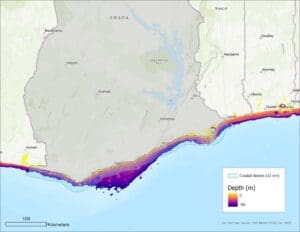
Legislation proposes that the exclusion zone is extended to 12 nautical miles or 50m depth, depending on which is further. Blue Ventures has calculated that by protecting shallow waters beyond 12 nautical miles, 15,886 square kilometres could be protected from industrial fishing, compared to 12,463 square kilometres’ protection from the 12 nautical mile zone – a 27% increase. Blue Ventures will support community-based organisations on the ground to ensure this is built into final legislation.
In a ripple effect, Senegal’s Director of Maritime Fisheries, Mr Ismaila Ndiaye, also pledged action against destructive industrial fishing in Senegal’s coastal waters, reaffirming the government’s intention to extend the limit of the zone reserved for small-scale fishing from six to 12 nautical miles. The director’s remarks follow increasing pressure from community groups and artisanal fisher associations in the region and all eyes will now be on the country’s Minister of Fisheries, Maritime and Port Infrastructure, Dr. Fatou Diouf, to officially commit to the extension.
Bottom trawling is driving an ocean emergency, for more information on its impacts, as well as the community based-organisations leading the way in its solutions, see transformbottomtrawling.org
Imagery by Garth Cripps, Al Harris and Chris Scarffe for Blue Ventures.

